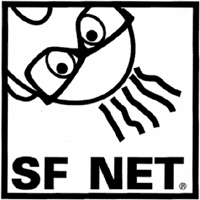
SF NET Coffee House Network was an electronic bulletin board system created by Wayne Gregori in San Francisco, California in July 1991.[1][2][3]
The network consisted of coin-operated, public access computers installed in many Bay Area coffee houses.[4][5] SF Net allowed individuals from all walks of life to communicate with each other via chat rooms and message boards. Additionally, it provided games and access to FidoNet.[6]
The coffee shop terminals were the culmination of a series of clever solutions to the problems of long-term remote placement in areas marked by low supervision and a young crowd. According to the then-popular Boardwatch magazine, the inexpensive, hence replaceable PC XT sat inside a locked plywood cabinet with vandalism-resistant Zolatone[7] paint and "keyboard condoms," or spill-resistant rubber coverings. Wayne Gregori engaged David Lahti as a friend and fellow visionary to help develop and operator of a popular San Francisco BBS, to develop and maintain the code base for the cafe table's communications software named, TableTalk, the BBS code base was maintained by Gregori. Lahti and Gregori developed and introduced a handshake between the coffee shop terminals and the BBS to distinguish them from other callers, ensuring paying customers could continue to use dedicated lines.[8]
Participating Coffee Shops
| Name | Location |
|---|---|
| Brain Wash | 1122 Folsom Street, San Francisco, California |
| Horseshoe Cafe | 566 Haight Street, San Francisco, California |
| Ground Zero | 783 Haight Street, San Francisco, California |
| Club Coffee | 920 Valencia Street, San Francisco, California |
| The Coffee Zone | 1409 Haight Street, San Francisco, California |
| Muddy Waters | 521 Valencia Street, San Francisco, California |
| Jammin Java | 701 Cole Street, San Francisco, California |
| Java Bound | 1916 Irving Street, San Francisco, California |
| Jammin Java | 1398 9th Avenue, San Francisco, California |
| Java Source | 343 Clement Street, San Francisco, California |
| Laundry Cafe | 570 Green Street, San Francisco, California |
| Caffe Roma | 526 Columbus Avenue, San Francisco, California |
| Monday Blu's | 3821 18th Street, San Francisco, California |
| Cafe Nefeli | 1854 Euclid Street, Berkeley, California |
| Cafe Milano | 2522 Bancroft Way, Berkeley, California |
| Espresso Roma | 2960 College Avenue, Berkeley, California |
| Coffee Source | 2404 Telegraph Berkeley Street, Berkeley, California |
| Cafe Mediterraneum | 2475 Telegraph Avenue, Berkeley, California |
| Gaylord Cafe | 4123 Piedmont Avenue, Oakland, California |
| Central Park Books | 32 E. Fourth Street, San Mateo, California |
| Royal Ground | 1146 4th Street, San Rafael, California |
| Caffe Nuvo | 556 San Anselmo Avenue, San Anselmo, California |
| Mama's Royal Cafe | 387 Miller Avenue, Mill Valley, California |
| Java Beach | 1396 La Playa St, San Francisco, California |
SF Net discontinued service in August 1997.
See also
- Community Memory, a public access system similar to SF Net
References
- ↑ John Flinn (18 August 1991). "High-tech small talk offered at The City's cafes". San Francisco Examiner.
- ↑ Leonard, Andrew. "CyberCafes Mean Business". Retrieved 20 August 2012.
- ↑ Katherine Bishop (2 August 1992). "The Electronic Coffeehouse". New York Times.
- ↑ John Boudreau (17 February 1993). "A Cuppa and a Computer". Washington Post.
- ↑ Linda Joyce (1991). "SF NET Coffee House Network CNN Report 1991 San Francisco". CNN.
- ↑ Shann Nix (14 January 1993). "The Computerized Kaffeeklatsch". San Francisco Chronicle.
- ↑ "Zolatone - Technical Information". Master Coating Technologies. Retrieved 20 August 2012.
- ↑ "SFNet - Coin Operated Bulletin Board Invades Coffee House Culture". Boardwatch Magazine: 65–69. May 1993.